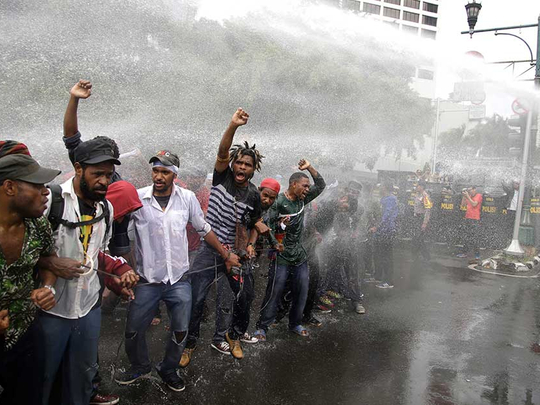
Jakarta: Indonesian police on Thursday fired water cannon in a bid to disperse a demonstration against Jakarta’s rule over the insurgency-hit eastern region of Papua, and rounded up scores of protesters.
About 150 protesters rallied in Jakarta to mark the anniversary of Papua’s 1961 declaration of independence, two years before Indonesia took control of the region from former colonial ruler the Netherlands.
Insurgents have been fighting against rule from Jakarta ever since, while the central government has sought to keep a tight grip on the resource-rich region with a heavy military and police presence.
The protesters, mostly university students from the Free Papua Organisation and the Papua Student Alliance, yelled “Free Papua”, facing off against hundreds of police in riot gear.
“It’s enough. Our people have been killed and detained, it’s enough,” said protester Cheko, who only gave one name.
Four demonstrators were detained after police accused them of displaying the pro-independence “Morning Star” flag, which is banned, and most of the other protesters were later taken away in police vans, going voluntarily without any violence breaking out.
Veronica Koman, a lawyer from Jakarta Legal Aid Foundation, said the group had a team of lawyers ready to defend the protesters.
Six years after taking control of Papua, Indonesia held a referendum that it says validated its claim to the region. But the vote was widely seen as a sham, with Jakarta hand-picking 1,026 people to vote on behalf of all Papuans.
There are regular small-scale clashes between insurgents, fighting on behalf of the ethnic Melanesian population, and security forces in Papua. Activists often accuse police and the army of committing human rights abuses in the name of anti-rebel operations.
President Joko Widodo has pledged to improve livelihoods in Papua, which is one of the least developed regions of the archipelago, and has repeatedly travelled there during his two years in office.
Organisers had promised protests in other cities and said police had denied them permission to march in central Jakarta.
The dozens of demonstrators were blocked from marching onto a busy traffic circle in the capital by several hundred police who fired water cannons and dragged several men from the crowd into waiting vans. After about three hours, they agreed to end the protest and were detained by police.
“Don’t hinder our right to voice our aspirations. Papuans are demanding the truth of our history,” a speaker standing atop a small truck shouted at the crowd. Members of the Papua Students Alliance chanted “Freedom Papua” and others sang independence songs.
Rights groups accuse the Indonesian military of serious human rights abuses in Papua and some Melanesian island states have also voiced concerns and called for Papuan independence.
Many West Papuans see December 1 as the anniversary of what should have been their independence.
The Dutch colonisers of the Indonesian archipelago held onto West Papua when Indonesia became independent after Second World War. It became part of Indonesia following a UN-supervised referendum in 1969 criticised as undemocratic.
“They feel that the referendum back then in 1969 was a sham,” said Veronica Koman from the Jakarta Legal Aid Institute.
“There were 800,000 West Papuans at that time. West Papuans were promised one man and one vote. But instead only 1,022 turned up, it was set up that way. They have to vote with the military all over them and intimidation. It’s illegal. And they want Indonesia to admit that and hold a referendum,” she said.
A low-level insurgency has plagued the mineral-rich region, which is ethnically and culturally distinct from much of Indonesia, for years.
The Indonesian government, which for decades had a policy of sending Javanese and other Indonesians to settle in Papua, is now also trying to spur economic development to dampen the separatist movement.












